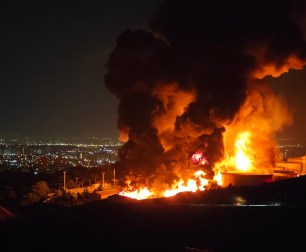Fifty-three years ago today, Israel was fighting for its survival. In a larger sense, that doesn’t make it all that different from any day in the preceding 19 years or the 53 that have followed. The Six-Day War was different, however, because it not only saw the tiny nation’s improbable victory over three Arab powers bent on its destruction, it returned vast swathes of the Land of Israel to Jewish custodianship. Two thousand years of history had been overturned in less than a week.
The legacy of this war is still debated today, because, in the words of Yossi Klein Halevi, victory ‘turned Israel into… history’s most improbable occupier’. Now we are told Israel is becoming an apartheid state — we’ve been told this for decades — because Benjamin Netanyahu is preparing to ‘annex the West Bank’. The UK’s Middle East Minister James Cleverly has denounced ‘annexation which we have consistently said we oppose — and which could be detrimental to a two-state solution’. Prominent British Jews have expressed ‘concern and alarm at the policy proposal to unilaterally annex areas of the West Bank’.
One problem: Israel isn’t preparing to annex the West Bank. I don’t mean in the sense that Haaretz’s Anshel Pfeffer has been warning: that Bibi has no intention of fulfilling his election promise. Bibi may well opt to keep the relative peace seen in the territories in recent years, but that’s not the issue. I’m not even pettifogging about the fact that the correct terminology is not ‘West Bank’ but Judea and Samaria. Though it is.
What Netanyahu has pledged to do is change the legal status of Israeli settlements as well as the Jordan Valley, a topographical buffer zone between Israel and Jordan. All in all, 30 per cent of Judea and Samaria would be governed in the same manner as the rest of Israel, leaving the remainder under a mixture of Israeli military administration and Palestinian civilian control.
This is not annexation. Under international law, annexation describes ‘the forcible acquisition of territory by one state at the expense of another’, and a) there is only one state involved in this dispute, b) since Israel already exercises a form of sovereignty over the territory in question, there would be no fresh acquisition, and c) the proposed changes would see the settlements and the Jordan Valley transfer from military to civilian law, the very opposite of the belligerence implicit in ‘forcible’.
That even proponents of this status change are calling it ‘annexation’ will only trigger even wilder paroxysms in its opponents. If Israel talks like a thief, it will be treated like one. How Israel should talk is as a party to a territorial dispute which believes its sovereign claims are stronger than those of its rival. It should make the international law case — emanating from the San Remo Conference resolution, the League of Nations Mandate and the laws of war — for Israel as the de jure sovereign within the borders inherited from the Mandate. It should speak about the application of Israeli law as the beginning of demilitarisation, freeing Israelis from the whims and caprices of the defence minister and giving the Palestinians another opportunity to choose peaceful self-government.
Instead the Palestinian Authority has ended security cooperation with Israel and, should Netanyahu go ahead with the policy, we can expect an upsurge in terror attacks. Still, Israel enjoys the preponderance of firepower and, even if Palestinians launched another intifada, such a campaign could only be sustained so long.
The two theatres where Netanyahu will be tested are domestic public opinion and the relationship with the United States. It’s been all quiet on the West Bank front for some time and Netanyahu must calculate how much Israelis will be willing to tolerate in increased violence and disruption before they blame him. The international community’s endless bad faith means the views of the UN and the EU are largely irrelevant but Israel must be mindful of the possibility of a Joe Biden presidency, which would aggressively oppose any change to the status quo in Judea and Samaria.
Rejecting the term ‘annexation’ is not pedantry. You annex territory that does not belong to you and, at the very least, Israel has a territorial claim to Judea and Samaria. The Six-Day War rekindled a lost connection to Israel’s heartland. It was a war for survival fought by Israel’s old guard but the victory went to a new Israel, one for which survival wasn’t enough. Today Israel is more nationalist and more religious and this makes its liberal friends uncomfortable. They talk about its ‘right to exist’ or ‘right to self-defence’, as though they are doing the Jewish state a solid by concluding that, on balance, it shouldn’t be shoved into the Med. Israel is entitled not only to its existence and security, but to its national rights, and applying its laws to parts of Judea and Samaria is an expression of these rights. Ideally, Netanyahu would limit this action to the settlement blocs, where 80 per cent of settlers live, rather than isolated communities deeper into the territory but ideals don’t survive long in this conflict.
The failed two-state solution was premised on denying Israel’s rights, framing the conflict as one of Palestinian national rights against which Israeli security concerns had to be balanced. In implicitly accepting the Palestinians as the rightful owners of the land (and junking 3,800 years of history to do so), all incentive for them to negotiate peace were removed. They had already won and simply had to wait out the Zionists. Shifting to a new paradigm that recognises the national rights of both parties is the best chance of achieving peace and self-determination for the Palestinians. The Palestinians would be disabused of the fantasy that Israel will cease to be if they just hold on long enough and Israel, its own national rights vindicated, could not stand in the way of its neighbours’ rights being similarly upheld.
The idea of Israel unilaterally applying its laws to parts of Judea and Samaria might alarm or dismay or frustrate some of the country’s natural supporters. Maybe they’re right to feel this way; it’s certainly a gamble. But it’s not an annexation, and in demonstrating the territorial consequences of the failure to make peace, it could be the catalyst that brings about a Palestinian state and a lasting resolution.







Comments